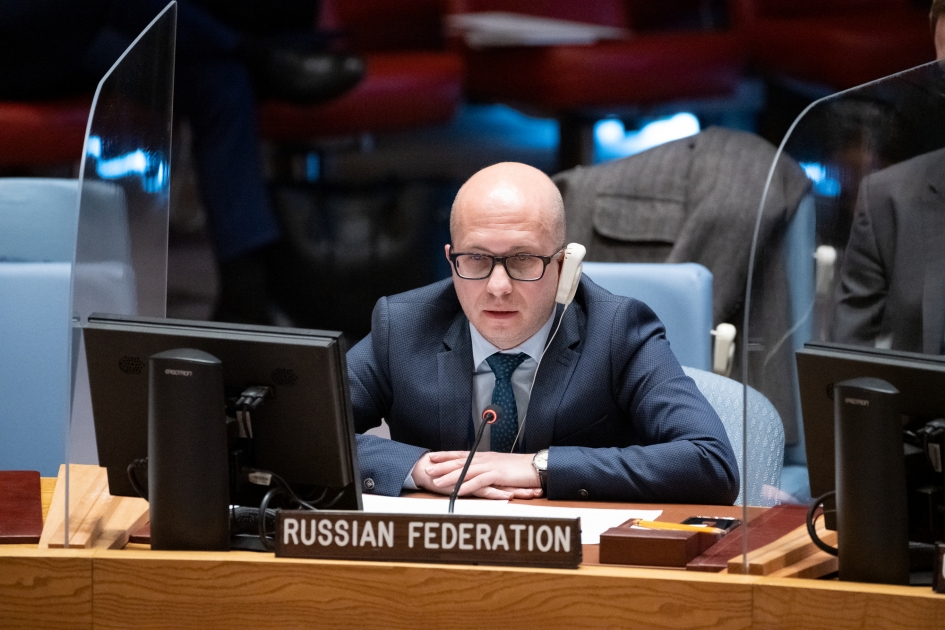Statement by representative of the Russian Federation Mr.Evgeny Varganov at UNSC briefing on the issue of equal access to COVID-19 vaccines in armed conflicts and humanitarian emergencies
Mr.President,
Today’s briefing on the issue of vaccination in the circumstances of armed conflict, post-conflict settings, and complex emergency humanitarian situations appears very relevant. We thank the briefers for providing a substantial review of the global situation with ensuring universal immunization against COVID-19 in most problematic conditions, and giving recommendations as to how to improve the situation at this track.
Proceeding from the Council’s area of responsibility, and main prescripts of its resolutions 2532(2020) and 2565(2021), we would like to commend efforts of the UN Department of Operational Support in organizing a vaccination campaign among peacekeepers at a proper level. We also welcome partnership for COVID-19 vaccine delivery, which was instituted by WHO, UNICEF, and GAVI Alliance in order to strengthen coordination of relevant activities. This appears especially important in view of the fact that problems related to logistics and the ability of national healthcare systems to ensure due usage of vaccines they receive come to the forefront today. In the first place, this happens due to an unprecedented number of illegitimate sanctions.
In this regard, we hope that increased coordination and effectiveness of this activity will let us improve the statistic of COVID-19 vaccination in 25 most needing states, where vaccination rate has stood at no more than 10 % until this day. We also hope that so-called humanitarian buffer, focused on most vulnerable categories of recipients within COVAX multilateral framework, will start working soon. We would welcome opinions of the briefers as to how we can address problems that impede this process, in particular the legal issue of indemnities.
Unfortunately, we did not hear today’s statements give either analysis or assessments of the impact of illegal unilateral coercive measures in the area of economy on achievement of the global vaccination goal. Such UCMs only undermine healthcare and economies of affected states. We must say that this topic does not have enough UNSC attention, which does not add to improving the situation. Among other factors worth being looked into we can name delays with national and international approval of anti-COVID treatment, expansion of access to technology, and establishment of delivery chains, countering disinformation and mistrust in vaccines.
Russia also has expertise in helping others solve COVID-related tasks in complex conditions. We delivered millions doses of vaccines and testing systems to other states, including countries on UNSC agenda, like the Syrian Arab Republic. According to latest data, more than 730 thousand people from People’s Republics of Donetsk and Lugansk, as well as Ukraine have arrived in Russia. All refugees can undergo COVID-19 testing in accommodation centers and medical facilities. If they will, they can get vaccinated with one of COVID-19 vaccines used in Russia (like any other Russian citizen) and receive free COVID-19 treatment.
We also keep working to improve our response to the novel coronavirus infection in the area of research and development. At the beginning of April 2022, a nasal type of two-component vaccine “Sputnik V” was registered in Russia. The vaccine is administered via a special spray cap.
According to resolution 2565, data on its implementation should be provided “as needed” or, alternatively, as part of “ordinary reporting” of Under-Secretaries-General whenever required. We believe this mode of discussing the issue at the Security Council is the optimal solution.
In conclusion, let me respond to remarks by one of the delegations that keeps using almost all Council meetings to make insinuations against my country. We have provided clarifications regarding our special military operation in Ukraine on many occasions, and we are not going to get back to this issue now.
